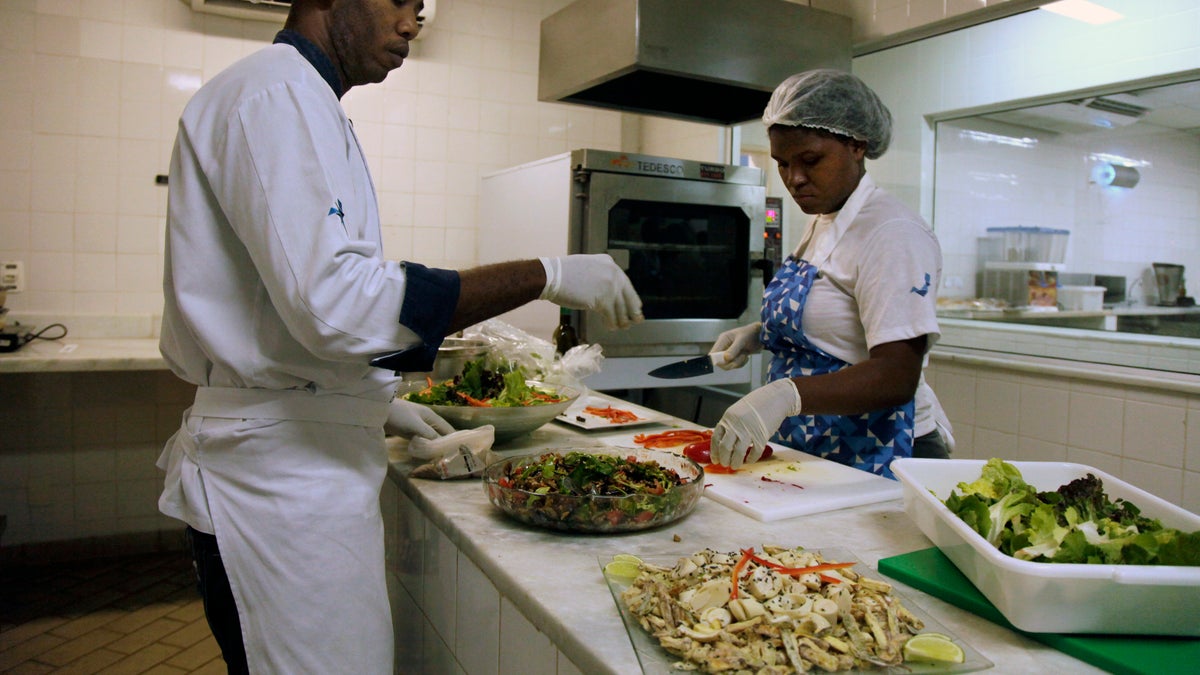
FILE - In this May 6, 2016, file photo, cooks prepare meals during one of many food-testing exercises of the Olympic menu in Rio de Janeiro, Brazil. The caloric intakes for athletes in certain sports as they train for major competitions like what awaits in Rio are massive, several times more than what the typical adult needs to get through a regular day. (AP Photo/Renato Spyrro, File) (Copyright 2016 The Associated Press. All rights reserved. This material may not be published, broadcast, rewritten or redistribu)
As far as bedtime snacks go, this one is not exactly classic.
Here's the concoction that U.S. swimmer Ryan Murphy came up with when he was desperate to get a lot of extra nutrients in a hurry before calling it a day: Handfuls of kale and spinach, followed by some beets, oatmeal, splashes of tart cherry juice and a little bit of mango, all tossed into a blender for a few moments.
He chugged it down, too.
"He knows he needs to get all the nutrients he can," said Alicia Kendig, the sports nutritionist for the U.S. swimming and track and field athletes that are competing in the Rio Games. "Some athletes want it to taste good. Ryan knows that he needs to just put all the good stuff in it and get it down. That was his way of getting a salad down right before bed."
When chasing gold medals, it's whatever it takes. Murphy will likely be thought of as a favorite in the 100- and 200-meter backstroke events in Rio. If he wins, people will hear the story of all the sacrifices he's made in his career.
What they probably won't hear about, or see, are the dietary demands on some of the athletes as they prep for an Olympics. The caloric intakes for athletes in certain sports — swimming among them — as they train for major competitions like what awaits in Rio are massive, several times more than what the typical adult needs to get through a regular day. The tale of Michael Phelps taking in 12,000 calories a day as he trained for the London Games was exaggerated, though probably only slightly.
"Oh, they eat a lot," Kendig said.
Making sure U.S. athletes get what they need, when they need it, wherever they are in the world is a massive undertaking. No event comes with more pressure on that front than an Olympics. The planning for each games lasts about two years, meaning that when this Olympiad ends there will be people already working on the system that will be used at the next Winter Games in South Korea in 2018.
"There's a lot of moving parts," said Terri Moreman, the U.S. Olympic Committee associate director of food and nutrition services — who was overseeing the unloading of seven tractor-trailer loads of things that were sent from Colorado Springs arriving in Rio on one recent day. "It is quite a challenge. You pay attention to the detail, try to stay ahead of it at all times, always anticipate what can go wrong and always have a Plan B."
No detail is left to chance. Moreman has been overseeing what was sent to Rio from the United States, along with what the USOC needed to rent or buy in Brazil. Some things were packed up months ago; others will be gotten as needed during the Olympics and Paralympics. A team of nearly a dozen chefs will prepare the food for U.S. athletes and staff will eat.
There's five sport dietitians like Kendig on staff as well, making sure athletes are building their plates the right way.
"When they get to a certain age, they really start realizing how much nutrition affects how they feel as well as what their bodies look like and the number on the scale," Kendig said. "Some of the younger athletes, they're still kind of exploring, a little more adventurous. The veterans really take it seriously."
Kendig has seen some interesting stuff lately.
She caught an athlete with his head in the refrigerator; he was busted eating fistfuls of kale, some of which went flying when he broke into laughter. An Olympic track athlete, on a recent training day that was relatively light, decided that he wanted a peanut-butter-and-jelly sandwich — but because it wasn't a big calorie-burning day, he enjoyed the "sandwich" with no bread.
"All he did was stir peanut butter and jelly together," Kendig said.
Sacrifice is part of being an elite athlete, though flavor doesn't always have to give. At a swimming training camp near San Antonio, the after-workout immediate reward was an icy cold smoothie with fresh berries and either plant or whey protein. And in the all-you-can-eat training table buffets, there are plenty of pastas, lean meats and fish.
And when the Olympics are over, yes, even super-fit athletes are looking for some comfort food.
"It's McDonald's," Kendig said. "Some of them have gone for so long being so dialed in what's healthy and nutrition-packed that it's a psychological release. So yes, they all do it. At least french fries."
